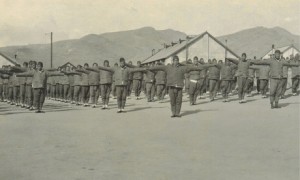Campaign launched to create memorial in London to workers literally painted out of a canvas recording nations who joined war effort
Maev Kennedy
The Guardian, Thursday 14 August 2014 13.02 EDT

Chinese Labour Corps recruits exercising in Weihaiwei prior to departure to Europe. Photograph: Private collection
The 95,000 Chinese farm labourers who, almost a century ago, volunteered to leave their remote villages and work for Britain in the first world war, have been called “the forgotten of the forgotten”.
The contribution made by the Chinese Labour Corps was barely recognised at the end of the war, and has almost been obliterated since. There is no tribute to them among Britain’s 40,000 war memorials, there are no descendants in Britain because they were refused any right to settle after the war, they were literally painted out of a canvas recording all the nations who joined the war effort, and many of the records of their service were destroyed in the blitz of the second world war.
However, a campaign has now been launched by the Chinese community in Britain to create a permanent memorial in London to the Chinese Labour Corps and the dirty, dangerous, vital work they did behind the lines on the western front.
Steve Lau, chair of the Ensuring We Remember campaign, was invited to the service of commemoration at Glasgow Cathedral 10 days ago. “My invitation was probably the first time the British government properly recognised the Chinese Labour Corps since the end of the war,” he reflected.
Recruitment of the Chinese began in 1916 as ever escalating casualties meant labourers became disastrously scarce. Many came from such remote farms that when they reached the tall buildings and busy waterfront of Shanghai, they thought they had arrived in Europe. In fact it was only the start of an appalling journey on which many died – by ship across the Pacific, six days crossing Canada in sealed trains to avoid paying landing taxes, on by ship to Liverpool, by train again to Folkestone, and on to France and Belgium, where they lived in labour camps and worked digging trenches, unloading ships and trains, laying tracks and building roads, and repairing tanks.
